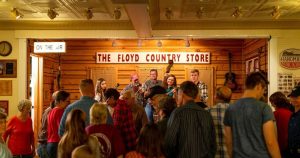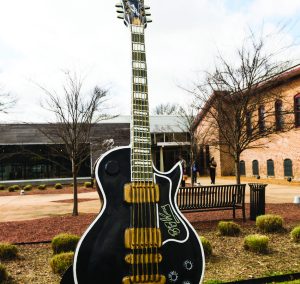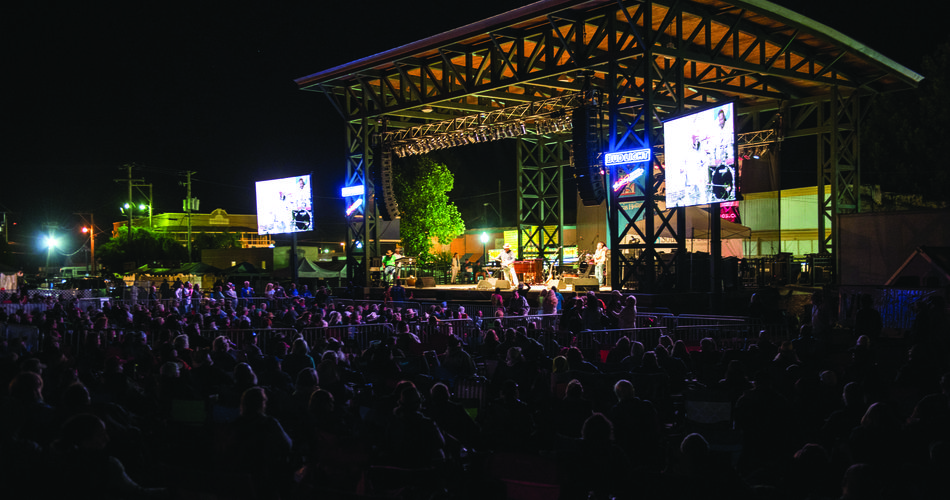Southern states take pride in their tuneful heritage, offering plenty of live music venues
Much of the music we hear today had its roots in the American South. From the mountains of Virginia and North Carolina, to the rich dark soil of Alabama, Mississippi and Arkansas, to cities like Memphis, New Orleans and Nashville, great music genres were born.
Mississippi
It’s widely acknowledged that the blues was born on Dockery Plantation near Cleveland, Mississippi. Charlie Patton arrived there in 1900, was influenced by older musicians and soon became the leader of a small group performing in the area. Blues, along with gospel music, had an impact on both country and rock ’n’ roll.
Identified by blue markers, almost 215 stops comprise the Mississippi Blues Trail. They tell the stories of musicians from churches and clubs, from cities and country outposts. Along the way are 13 museums that focus on the blues.
In addition, Mississippi has produced a number of country music artists and boasts a wide array of performance venues. The Magnolia State’s considerable contributions are shared on more than 40 markers on the Mississippi Country Music Trail.
Arkansas
What is it about the lower Mississippi River’s Delta region that produced so much of America’s music? Along the Arkansas Delta Music Trail: Sounds from the Soil & Soul, you’ll find the answer.
Gospel music flowed from small churches Sunday mornings, and adaptations of those songs found their way to juke joints along the river. The juke joints are gone, and small country churches have given way to larger places of worship, but the history continues.
From murals, markers and concerts to the Delta Cultural Center in Helena, the heritage of the blues is on full display, with more than 45 stops along the trail. Helena’s King Biscuit Blues Festival takes place in October.

In Floyd, the Floyd Country Store hosts the world-renowned Friday Night Jamboree.
Virginia
The year was 1927, and musicians and singers from the Blue Ridge Highlands and Heart of Appalachia arrived in Bristol. In what is known as the 1927 Bristol Sessions, recordings by the Carter Family, Jimmie Rodgers and Ernest V. Stoneman were made. It was the beginning of country music. The Crooked Road, Virginia’s Heritage Music Trail tells the story in 10 counties, 14 towns and three cities.
Birthplace of Country Music Museum in Bristol explores the rich heritage of country music and how it carries on today. Galax is home to the famous Galax Fiddlers Convention and the Rex Theater, a major music venue. In Floyd, the Floyd Country Store hosts the world-renowned Friday Night Jamboree.
North Carolina
Along the Blue Ridge Music Trails of North Carolina, you’ll hear the sounds of fiddle, banjo and string bands performing lively renditions of bluegrass and old-time music, two genres of mountain music that have been handed down through generations.
A variety of mountain music traditions nurtured in western North Carolina, including sacred music, lives on today. Learn more and hear the music at the John C. Campbell Folk School in Brasstown, Old Fort Mountain Music in Old Fort, Stecoah Valley Cultural Arts Center in Robbinsville.
Tennessee
From Bristol and Sevierville to Nashville, Memphis and more, Ken Burns Country Music Pathways, a PBS documentary, tells the story of country music. Visit the 22 sites where the history was made with a digital passport. Just Google “Ken Burns Country Music Pathway” and receive a text that you can use immediately. Save it to your smartphone’s home screen and you’re on your way.
From the original 1927 Bristol Sessions, the music moved to recording sessions in Memphis and Nashville, radio stations throughout the state and eventually to the stages of Nashville’s Grand Old Opry at Ryman Auditorium. Your passport takes you on a journey of country music history.
Louisiana
The state’s musical traditions feature indigenous music, including Cajun, zydeco and jazz. North Louisiana has had numerous influences on rock, gospel and country music. In Shreveport in 1956, the much-quoted phrase “Elvis has left the building” was first heard following Presley’s performance on the Louisiana Hayride show at Hirsch Memorial Coliseum.
Southwest Louisiana, Lafayette in particular, is perfect for hearing live zydeco and Cajun music. Restaurants throughout the area offer Cajun specialties and a dance floor. Cajun music and cooking highlight area festivals.
In New Orleans, live jazz, blues and gospel performances happen daily. Check for show times at historic Preservation Hall, where traditional New Orleans jazz is at its best.

Muscle Shoals Sound Studio in Sheffield, Alabama. Photo courtesy of Art Meripol and Alabama Tourism Department
Alabama
Great music and its traditions are no stranger to Alabama. If you’re a country music fan, you’ll recognize Hank Williams as a pioneer of the genre. A trail honors him, and there’s the Hank Williams Museum in Montgomery. Jimmy Buffett grew up in Mobile. Tour a music studio in Muscle Shoals where the likes of Aretha Franklin, Lynyrd Skynyrd, the Rolling Stones and Otis Redding recorded during the 1960s.
Check out the Sweet Home Alabama Music Trail, a six-day experience. From cafes, restaurants and delis to saloons, taverns and lounges, there are great options to hear jazz, blues and rock just about every night. Look into music festivals along the way.
Georgia
The Peach State’s music is something like a quilt. There’s mountain and bluegrass music drifting from the Appalachian and Blue Ridge mountains. In the southwest, you’ll find the Albany birthplace of Ray Charles, who took us from jazz to soul to blues to country and just about everything in between.
The Allman Brothers, Little Richard and Otis Redding found their musical path in Macon, where a must stop is the Allman Brothers Band Museum at the Big House. Rock ’n’ roller Little Richard worked as a busboy at what today is the Tic Toc while playing and practicing in the area.
It’s on to Augusta and the “Godfather of Soul,” James Brown. There are photo ops at the downtown statue, and the Augusta Museum of History theater shows clips from his career.
The university town of Athens seems to have drawn some of the best musical talent and continues to do so. The Georgia Theatre, 40-Watt Club, Caledonia Lounge and others are legendary venues.
South Carolina
Like many states bordered by mountains and the coast, South Carolina has a rich music history. The Marshall Tucker Band, Darius Rucker and Hootie and the Blowfish, along with Maurice Williams and the Zodiacs, Chubby Checker and Dizzy Gillespie, all hail from the Palmetto State. The music is far-ranging, from country and bluegrass to R&B, rock and pop.
South Carolina is where beach music was born. This offshoot of rock ’n’ roll and R&B carried dancers smoothly across the floor. The shag became the Official South Carolina State Dance.
Florida
The Sunshine State might not have originated music genres, but it’s sure the place to catch live music. From South Florida to Tallahassee, there are more than a dozen communities with multiple venues to catch live music, including Latin, country, rock, oldies, jazz, blues, easy listening, reggae, punk and techno.
By Dave Bodle
Main photo: King Biscuit Blues Festival in Helena, Arkansas. Photo courtesy of Bringing the Blues

